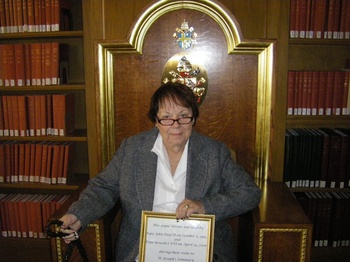Eternal
God, you established Blessed James as a model for your flock and made him
renowned for his zeal for peace and for his mercy towards your people. By his
prayers and example may we be united in the truth of your word and ever ardent
in your divine love.
Saint Mechtild (of Magdeburg)
“Then shall I leap into love”
I cannot dance, Lord, unless you
lead me.
If you want me to leap with abandon,
You must intone the song.
Then I
shall leap into love, From love into knowledge,
From knowledge into enjoyment,
And from enjoyment beyond all
human sensations.
There I want to remain, yet want also to circle higher still.
According to some scholars, this Cistercian-Benedictine nun and poet, theologian and mystic was the inspiration of Dante’s Divine Comedy. Interesting that her liturgical memorial comes at the end of the liturgical calendar given her visions of heaven, hell and purgatory! Some people register a doubt about her status as a canonized saint in the Church but she is remembered in the Roman Martyrology (2004) and venerated as such by many, including the Cistercian-Benedictines and that’s good enough for me. The Martyrology speaks of Saint Mechtild as a woman of exquiste doctrine and humility, and supernatural gifts of mystical contemplation.
The prayer for Saint Mechtild may be found here and her biography here.
Blessed Salome of Krakow and Blessed Cunegunda of Poland
Almighty God, You called blessed Salome from the cares of earthly rule to the pursuit of perfect charity; and You caused blessed Cunegunda to excel in purity of life and in wondrous charity towards the poor. Grant that through their example and intercession we may serve You with chaste and humble hearts and go forward rejoicing in spirit along the way of charity leading to eternal glory.
Deaf Catholics: finding room for the deaf in the Church
From a recent Zenit news article, I learned something that I never knew before: “It is estimated that there are 1.3 million deaf Catholics,
and the Vatican is intent on ensuring that they can fully participate in the
Church.” Archbishop Zygmunt Zimowski,
president of the Pontifical Council for Health Care Ministry, gave this statistic at his department’s 24th international conference meeting this week in Rome. The conference’s theme is “Ephphata: the Deaf
Person in the Life of the Church.”
“The prelate,” according to Zenit said, “estimated that in developed countries, one child
out of 1,000 is deaf, but the problem is more serious in poor countries, where
80% of the world’s deaf live. In these cases, deafness is often the result of
insufficient medical care and lack of medication.” He indicated “the need to help people with
this impairment, precisely as ‘the world has begun to overcome the
prejudices and superstitions linked to physical disability.'”
A liturgical resource for helping the deaf is Joan Blake’s Signing the Scriptures:
Plus, there’s the DVD Tips and Techniques for Signing the Scriptures.
Mom’s big birthday!
Saint Rose Philippine Duschesne
“Go forth to the world and proclaim the Good News!”
Thus sent forth, the Church has, with no time to lose,
Sent missioners brave to the ends of the earth,
That souls thralled in darkness may come to new birth.
With charity filled and heart burning with zeal,
Saint Rose sought to serve God, and sent her appeal,
Which brought her companions who caught her delight
And went to Missouri to spread Jesus’ light.
In hardship and hunger, she forged on with strength;
For girls’ education, she struggled at length.
And then, when her work and her harvest was nigh,
She turned to the missions for natives nearby.
O praise God the Father, O praise God the Son,
And praise God the Spirit, the great Three-in-One.
We ask through Saint Rose for strong faith, hope, and love,
As we praise the One who is reigning above.
J. Michael Thompson
Bishops approve translations of last five sections of Roman Missal
BALTIMORE (CNS) — The U.S. bishops approved the English
translation and U.S. adaptations of five final sections of the Roman Missal in
voting on the second day of their annual fall general assembly in Baltimore.
With overwhelming majority votes, the bishops approved translations of the
proper of the saints, specific prayers to each saint in the universal
liturgical calendar; the commons, general prayers for celebrating saints listed
in the “Roman Martyrology”; the Roman Missal supplement; the U.S.
propers, a collection of orations and formularies for feasts and memorials
particular to the U.S. liturgical calendar; and U.S. adaptations to the Roman
Missal. There was some debate on the floor about a separate piece of the
translations — the antiphons — which has not come to the bishops for
consideration, but instead has advanced through the Vatican’s approval
procedures without the consultation of the English-language bishops’
conferences around the world. But the final five sections of the missal before
the bishops passed with minimal discussion and only a handful of proposed
amendments to the texts. The Vatican’s Congregation for Divine Worship now must
grant its “recognitio,” or approval, to allow the translations to
proceed.
Read Father John Zuhlsdorf’s perspective on the liturgical translation
issue passed today. As Father Z said, it’s over!
Saint Paul and the market place: giving testimony to Christ building unity
As you are aware, the Pope is assisted by various departments
as pastor of the Church. Without naming all of them, the significant ones are
Faith, Worship, Saints, Clergy and Evangelization. The latter department is
headed by the Indian cardinal, Ivan Dias. As “Prefect of the Congregation for
the Evangelization of Peoples” he works with the world’s bishops and other
competent folk in sharing the Good News. Each year all the departments meet
with the full body of members and experts to deal with the significant issues
identified by the Pope and the Cardinal. In the case of this address, one can’t help thinking of the work of the of new lay movements in the Church and some of the new religious orders doing the hard work of being in the marketplace. I for one, can’t help remember the Pope’s address to the Benedictine Oblates of St Frances of Rome where he praised them for keeping a religious life with a particular focus of being in the center of the city as a witness to Christ while helping the poor.
What follows is the Pope’s address to
the plenary session of Congregation for the Evangelization of Peoples. Note the
points emphasized.
On the occasion of the plenary assembly of the Congregation
for the Evangelization of Peoples, I wish to express to you, Lord Cardinal, my
cordial greeting, which I happily extend to the archbishops, bishops and all
those taking part in this assembly. I also greet the secretary, the assistant
secretary, the under-secretary and all the collaborators of this dicastery. I
add the expression of my sentiments of appreciation and gratitude for the service
you render the Church in the area of the mission ad gentes [to the peoples].
The topic you are addressing in this meeting, “St. Paul
and the New Areopagi” — also in light of the Pauline Year concluded a
short while ago — assists in reliving an experience of the Apostle to the
Gentiles while in Athens. After having preached in many places, he addressed
the Areopagus and there proclaimed the Gospel using a language that today we
could describe as “inculturated” (cf. Acts 17:22-31).
That Areopagus, which at the time represented the center of
culture for the refined Athenian people, today — as my venerated predecessor
John Paul II would say — “can be taken as a symbol of the new sectors in
which the Gospel must be proclaimed” (Redemptoris Missio, 37). In fact,
the reference to that event is an urgent invitation to know how to value the
“Areopagi” of today, where the great challenges of evangelization are
addressed.
You wish to analyze this topic with realism, taking into
account the many social changes that have occurred: a realism supported by the
spirit of faith, which sees history in the light of the Gospel, and with the
certainty that Paul had of the presence of the Risen Christ. Resonating and
comforting for us also are the words that Jesus addressed to him in Corinth:
“Do not be afraid. Go on speaking, and do not be silent, for I am with
you. No one will attack and harm you,” (Acts 18:9-10).
In an effective way, the Servant of God Paul VI said that it
is not just a question of preaching the Gospel, but of “affecting and as
it were upsetting, through the power of the Gospel, mankind’s criteria of
judgment, determining values, points of interest, lines of thought, sources of
inspiration and models of life, which are in contrast with the Word of God and
the plan of salvation” (Insegnamenti XIII, [1975], 1448).
It is necessary to look at the “new Areopagi” with
this spirit; some of these [areas], with present globalization, have become
common, whereas others continue to be specific to certain continents, as was seen
recently in the special assembly for Africa of the synod of bishops. Therefore,
the missionary activity of the Church must be directed to the vital centers of
the society of the third millennium.
Not to be underestimated is the influence of a widespread
relativistic culture, more often than not lacking in values, which enters the
sanctuary of the family, infiltrates the realm of education and other realms of
society and contaminates them, manipulating consciences, especially those of
the young. At the same time, however, despite these snares, the Church knows
that the Holy Spirit is always acting. New doors, in fact, are opened to the
Gospel, and spreading in the world is the longing for authentic spiritual and
apostolic renewal. As in other periods of change, the pastoral priority is to
show the true face of Christ, lord of history and sole redeemer of man.
This demands that every Christian community and the Church
as a whole offer a testimony of fidelity to Christ, patiently building that
unity desired by him and invoked by all his disciples. The unity of Christians
will, in fact, facilitate evangelization and confrontation with the cultural,
social and religious challenges of our time.
In this missionary enterprise we can look to the Apostle
Paul, imitate his “style” of life and his apostolic
“spirit” itself, centered totally on Christ. With this complete
adherence to the Lord, Christians will more easily be able to transmit to
future generations the heritage of faith, capable of transforming difficulties
into possibilities of evangelization.
In the recent encyclical Caritas in Veritate, I
wished to emphasize that the economic and social development of contemporary
society needs to renew attention to the spiritual life and “a serious
consideration of the experiences of trust in God, spiritual fellowship in
Christ, reliance upon God’s providence and mercy, love and forgiveness,
self-denial, acceptance of others, justice and peace. Christians long for the
entire human family to call upon God as ‘Our Father!'” (No. 79).
Lord Cardinal, while thanking you for the service that this
dicastery renders to the cause of the Gospel, I invoke upon you and upon all
those taking part in the present plenary assembly the help of God and the
protection of the Virgin Mary, star of evangelization, while I send my
heartfelt apostolic blessing to all.
From the Vatican, November 13, 2009
BENEDICTUS XVI PP
Saint Elizabeth of Hungary
 With the Church we pray, “Father, You helped Elizabeth of Hungary to recognize and honor Christ in the poor of this world. Let her prayers help us to serve our brothers and sisters in time of trouble and need.”
With the Church we pray, “Father, You helped Elizabeth of Hungary to recognize and honor Christ in the poor of this world. Let her prayers help us to serve our brothers and sisters in time of trouble and need.”
This prayer says it all! How much more encouragement do we need to live the gospel and the sacraments of the Church?
Cardinal Walter Kasper speaks on Anglicanorum Coetibus
Edward Pentin of the National Catholic Register penned a piece “Cardinal Kasper on Anglicanorum Coetibus” which dispels much of the misinformation found in both the secular and Catholic media, including certain blogs, about the recent events between Canterbury and Rome. Hopefully, L’Osservatore Romano will provide an English translation of the article they published as a referenced by Mr. Pentin; I am curious to know more. One thing to remember is to interpret these things with charity and understanding. Pray, too, for a profitable meeting between Archbishop Williams and Pope Benedict on Saturday.


